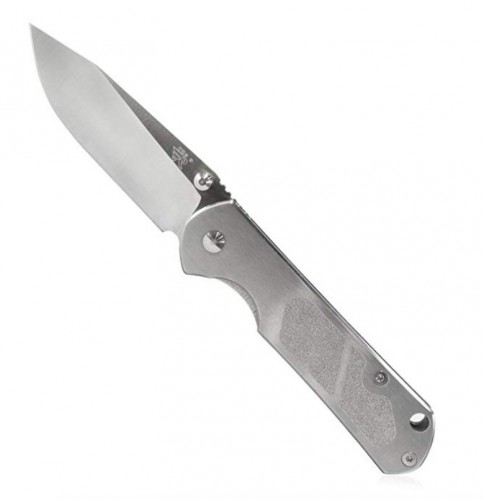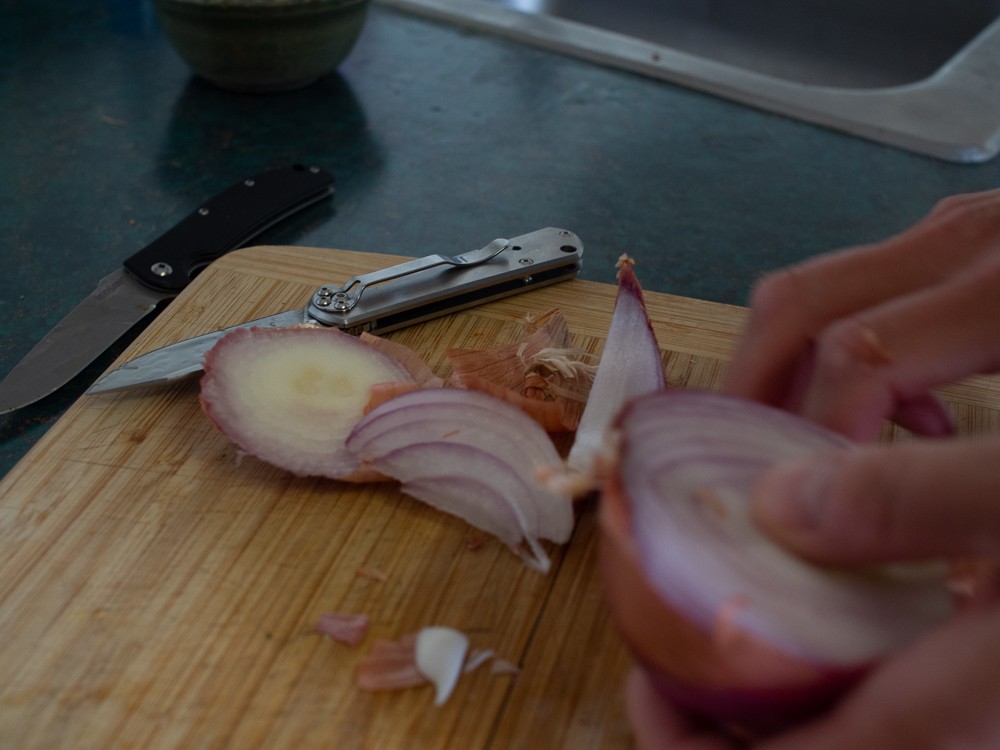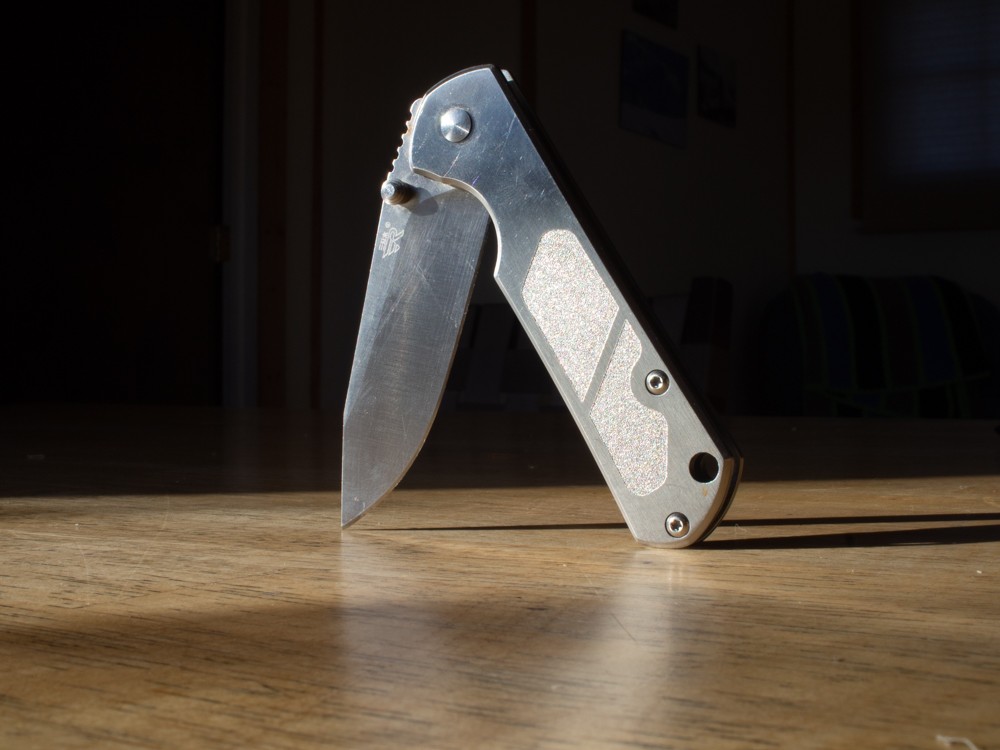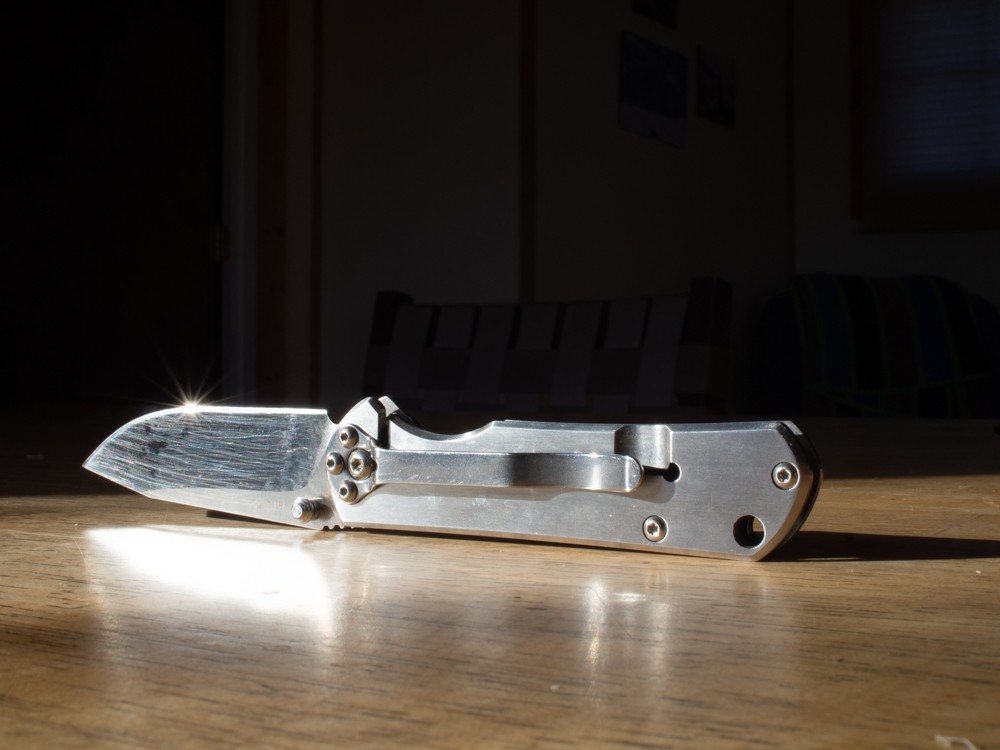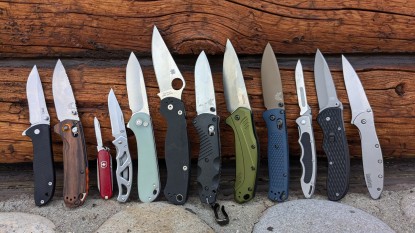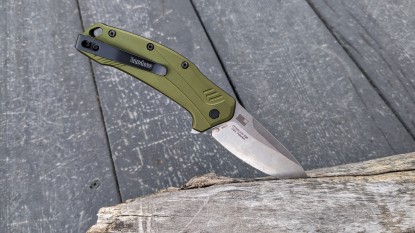Sanrenmu 7010 Review
Our Verdict
Our Analysis and Test Results
The 7010 from Sanrenmu (formerly available as the Sanrenmu 710) is a budget knife with great performance attributes. For the quality, its price is phenomenal. How does Sanrenmu do this? It is rumored that Sanrenmu, a Chinese company, was originally an OEM factory, just making knives to other companies' specifications that were then sold under these other companies' brands. It isn't entirely clear which knives were or are made there, but we may have some elsewhere in our review. What is clear, though, is that Sanrenmu has taken, for better or for worse, what it learned in executing the designs of others and applied these lessons to their own branded knives. The 7010 is a great knife at an amazing price. They leverage their scale and exposure to a sort of “insider knowledge” to produce a knife that truly transcends its price. This was an easy Best Buy Award choice.
Performance Comparison
Blade and Edge Integrity
The Sanrenmu blade is made of 8CR13MoV steel. It is a Chinese replication of AUS-8 steel and delivers characteristics and performance that transcend its price point. We test several knives with this steel and have been steadily impressed with its performance for the price.
We don't know how Sanrenmu heat treats the 7010, but it seems to be working. It was only at the very end of our first five weeks of testing, living in the pocket of our frequent knife user and lead test editor, that this Best Buy winner needed a sharpening. Doing so was clean and simple. It helps that we identified the need to sharpen early. Sharpen early and regularly, and it is simple. Wait too long, and it becomes a much more arduous chore.
This Sanrenmu has a long and very shallow angle hollow grind. This narrow initial edge is appreciated in cutting tomatoes and other soft things. The stiff and thicker spine of the blade backs it up in heavier tasks. The edge angle is also pretty shallow, making for great cutting feel and apparent edge “sharpness,” but requiring more frequent sharpening. The blade geometry (deep hollow grind, with a thin leading edge) feels familiar and not unlike our Editors' Choice selection.
Ergonomics
What does it take to get the Best Buy Sanrenmu in hand and use? Once deployed, how does it perform the tasks you'll ask of it? We're largely pleased with the ergonomics of the 7010. Given the intended use and price, we have nothing to complain about. In use, the handle is thick enough to respond to heavier pressure. A more rounded and bulkier profile is even better for heavy use, but it compromises portability.
Deploying the blade is smooth, with just the slightest amount of important “stick” at the beginning. Closing the blade requires disengaging the frame lock. Which, in turn, requires sticking your finger between the hinging blade and handle, at least momentarily. This stresses some out but is inherent in liner and frame lock mechanisms.
The pocket clip is secure but gives it up when needed. The orientation of the pocket clip deserves mention. It is configured for only right-hand, tip-down carry. Many knives come with the option to move the pocket clip around, allowing for up to four different configurations. Right-hand access makes sense if a manufacturer has to commit to one pocket clip orientation. About 75-90% of the world's population is right handed. While preference for tip-up or tip-down pocket knife carry isn't as well studied, our test team definitely prefers tip-up orientation. We wish that Sanrenmu, if they had to commit to one configuration, had committed to right-hand tip-up carry. Otherwise, it works just fine.
Portability
You can carry the Sanrenmu loose in your pocket, clipped to said pocket, or on a lanyard of your creation. The knife is only 0.4 inches thick, disregarding the pocket clip.
The whole package weighs 3.2 ounces (90g). For the size, this is pretty heavy. The stainless steel handle bumps the weight over that of knives with more expensive composite or titanium handles.
Most edges and faces of the Sanrenmu are beveled and smoothed. This saves wear and tear and snagging on your pants and purse pockets. The exception is the thumb studs. Both stick out past the handle and have machined “traction” rings with square edges. These protrusions, when carrying, can and do snag and accelerate wear to the fabric around it. It isn't the worst out of all the knives we tested, but it isn't a non-issue.
Construction Quality
First impressions usually tell more about the construction quality of a knife than you would believe. We like to hand a knife to someone that knows little to nothing about pocket knives. Their impressions are remarkably consistent with our deeper dive and our ongoing testing and use. The Sanrenmu holds up in both instances. While “feel” is subjective and memory is imperfect, we are reasonably confident that the main pivot has lost no tension or smoothness in our months of use. None of the mechanisms have developed any play.
Almost the whole knife is made of stainless steel. The bolts, handle “scales,” pivot, and pocket clip are all matching steel. The blade looks slightly different because it is. In the pivot are two bushings. One is brass, and one is plastic, but both are very thin. The pocket clip has lost no spring tension.
Other Features
There are few to no features on many of the knives we've tested, including the Sanrenmu. We have to note them and grant them their due credit, but we don't penalize knives that don't have extra tools or features. If anything, extra tools and features take away from other attributes. Most of our top-scoring knives, like the Sanrenmu, have no additional features beyond the blade and pocket clip.
Should You Buy the Sanrenmu 7010?
We dig the Sanrenmu's performance, quality, and cost. Some people spend more on a six-pack of beer than you will on this knife. The Chinese company leverages an economy of scale and the ready availability of good knife-making materials. Further, mass distribution channels keep costs down. You can get this thing delivered from Amazon tomorrow. Crazy times. One hundred years ago, you would have had to hire a trained craftsman for a few full days to replicate this. Now you can get one for the equivalent of one hour's high-end fast-food wages. We are well aware of what it says about international economic and intellectual property considerations.
What Other Pocket Knives Should You Consider?
It's tough to argue against the value of the Sanrenmu 7010 considering its overall performance relative to its rock-bottom pricing. But more expensive knives, like the Kershaw Leek, will likely last longer thanks to superior construction quality. When you step up from options like the Leek to high-end models like the Benchmade Mini-Barrage 585, you will notice a significant improvement in the blade and edge integrity.


